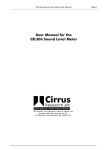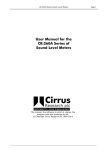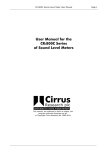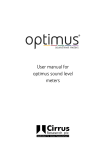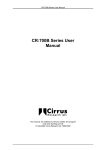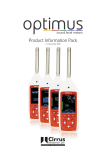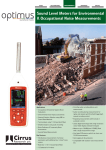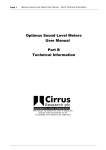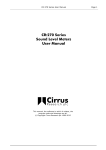Download CK:199 Trojan2 Noise Nuisance Recorder User Manual
Transcript
CK:199 Trojan2 Noise Nuisance Recorder User Manual Guide CK:199 Trojan2 Noise Nuisance Recorder User Manual Page 1 CK:199 Trojan2 Noise Nuisance Recorder User Manual Guide Page 2 Copyright Copyright © Cirrus Research plc 2010-2013 All rights reserved. You may re-use this document/publication (not including the Cirrus Research plc logo and other product logos) free of charge in any format for research, private study or internal circulation within an organisation. You must re-use it accurately and not use it in a misleading context. You must not modify text, images or illustrations in any way. The material must be acknowledged as Cirrus Research plc copyright and you must give the title of the source document/publication. Where any third party copyright material is identified you will need to obtain permission from the copyright holders concerned. Trademarks Cirrus Research plc, the Cirrus Research plc Logo, doseBadge, DOSEBADGE, optimus, Trojan, the Trojan Logo, the NoiseTools Logo and the Noise-Hub Logo are either registered trademarks or trademarks of Cirrus Research plc in the United Kingdom and/or other countries. Microsoft and Windows are registered trademarks of Microsoft, Inc. All other trademarks acknowledged. Updates In the interests of continuous product improvements, Cirrus Research plc reserves the right to make changes to product specifications without notice. To understand the latest updates that have been implemented into this product and to download the most current version of this user manual, visit our web site at www.cirrusresearch.co.uk Instrument Serial Number & Information Please record the serial number and purchase date of your instrument below along with details for any accessories supplied with your optimus sound level meter. Instrument Serial Number Purchase Date _________________________________________________ _________________________________________________ _________________________________________________ Publication History Issue 2.0 July 2013 Trojan/07/13/2.0EN CK:199 Trojan2 Noise Nuisance Recorder User Manual Guide Page 3 About this user manual ................................................................................................ 4 Introduction ................................................................................................................. 5 Using the sound level meter as a handheld instrument ................................................ 6 Quick Start Guide ......................................................................................................... 7 Getting started ............................................................................................................. 8 Connecting the cables ....................................................................................................8 Connecting the microphone & preamplifier........................................................................8 Mounting the microphone.......................................................................................................... 8 Switching on .................................................................................................................9 Check the instrument clock .............................................................................................9 Memory Size with audio recordings ..................................................................................9 Calibrating the instrument ............................................................................................ 10 Starting a measurement ............................................................................................... 10 Making a recording ...................................................................................................... 10 Starting a recording ................................................................................................................ 10 Stopping a recording ............................................................................................................... 11 Pre-Trigger & Post-Trigger ....................................................................................................... 11 Ending a measurement ................................................................................................ 11 Packing away the instrument ........................................................................................ 12 Downloading data to the NoiseTools software ............................................................ 13 Connecting to a PC ...................................................................................................... 13 Downloading measurements ......................................................................................... 13 Selecting measurements .............................................................................................. 14 Viewing a measurement ............................................................................................... 15 Selecting an audio recording ......................................................................................... 15 Replaying an audio recording ........................................................................................ 16 Appendix 1 Configuring the sound level meter for noise nuisance measurements ..... 18 Appendix 2 Instrument layout .................................................................................... 21 RC:199 Remote Control Unit ......................................................................................... 22 Appendix 3 Using a wired remote control ................................................................... 22 Appendix 4 Adding a new RC:199 wireless remote control ......................................... 23 Pairing a new RC:199 Remote Control with the Receiver Unit ............................................ 23 CE Declaration of Conformity ...................................................................................... 25 Equipment Description ............................................................................................... 25 Warranty Information. ............................................................................................... 26 Cirrus Research Offices .............................................................................................. 27 Page 4 CK:199 Trojan2 Noise Nuisance Recorder User Manual Guide About this user manual • The instructions in this user manual refer to the operation of the Cirrus Research plc Trojan2 Noise Nuisance Recorder • The instruments described in this manual are the CK:199A & CK:199B Trojan2 Noise Nuisance Recorders • Some of the functions and features described in this manual may only be available on certain versions of the instrument. Where functions may be optional they will be indicated. • In this manual, “instrument” is used as a general reference for the sound level meter or Trojan Noise Nuisance Recorder, “remote control” for the RC:199 Remote Control Unit and “calibrator” for an acoustic calibrator. • This manual describes the recommended method of operation of use for the instrument and any described accessories. • Throughout this manual, icons and symbols may be used to highlight important information and these sections should be read carefully. On page 7 is a Quick Start Guide to using the Trojan2. In addition to this guide, we would recommend that you read through the rest of this manual before using the Trojan for the first time to make sure that you are familiar with the functions and features. CK:199 Trojan2 Noise Nuisance Recorder User Manual Guide Page 5 Introduction The Trojan2 is an advanced noise nuisance recorder that has been designed to be simple to both setup and operate. The system features a precision data logging sound level meter which records both the noise levels and audio recordings over long periods of time. Once the equipment is installed and setup, the user has no control over the operation of the sound level meter which will measure and store noise levels for up to 10 days in a single session. The only interaction needed by the user is to start and stop the audio recordings using the standard wireless remote control or the optional wired remote control. The user should also ensure that continuous power is provided to the unit. When the remote control is activated, the instrument will start to record audio and will continue to do so until the stop button is pushed on the remote control. If the user forgets to press stop, the instrument will end the audio recording after 5 minutes, whilst the measurement of noise levels continues. The system also features a pre and post trigger system that allows the audio recordings to include 30 seconds of information from before and after the user starts and stops the recording. Note that the instrument must have been measuring for 30 seconds before the full pre-trigger is available. Page 6 CK:199 Trojan2 Noise Nuisance Recorder User Manual Guide The amount of time available for the pre and post trigger can be adjusted in the NoiseTools software. If the external mains power is removed the unit will run on its internal batteries for approximately 8 hours with a new set of batteries. Changing the batteries is covered in the sound level meter user manual supplied with the Trojan2. If the power is reconnected before this time, the system will simply revert to mains power and continue unaffected. If the mains power is not reconnected and the internal batteries are run down, the instrument will store the noise data and audio recordings and then shut down safely. After a shut-down when the mains power is reconnected, the instrument will reboot and after 10 minutes (or when the remote control is pressed or the Start button on the keypad is pressed if this is sooner) restart measuring and storing noise data. This reduces the risk of data being lost when power is removed from the system. All of the measurements are stored directly to a high performance memory card which is internal to the system. The measurements are stored continuously which prevents data loss and ensures that the data cannot be tampered with or adjusted before it is downloaded to the reviewing software. Using the sound level meter as a handheld instrument The Sound Level Meter can be removed from the case and used and as a standalone instrument with the microphone and preamplifier. Before removing the sound level meter from the case, ensure that it is switched off by holding down the power button and following the on screen instructions. For details of using the sound level meter as handheld instrument, please refer to the optimus Sound Level Meter user manual supplied with the Trojan2 Noise Nuisance Recorder. CK:199 Trojan2 Noise Nuisance Recorder User Manual Guide Page 7 Quick Start Guide • Connect cables o Microphone Cable & Power Cable • Check instrument batteries o Replace the instrument batteries if they are not full • Connect Microphone & Preamplifier o o • Use the remote control to start & stop audio recordings Press the Stop key on the sound level meter Press the Exit button on the sound level meter Press and hold the power button for 5 seconds. The instrument will show the progress of the switch off process. Disconnect microphone & preamplifier o o o • Press start key on sound level meter Switch off o • Switch on calibrator Wait for calibration cycle Take care Stop measurement o o • Attach acoustic calibrator Press Calibrate on sound level meter Remove acoustic calibrator Attach windshield Starting & Stopping audio recordings o • Adjust if needed Start measurement o • Switch on power supply Check clock Calibrate sound level meter o o o o • Connect microphone & preamplifier to cable Connect to tripod mount Plug in power supply o o • If not already connected Remove windshield Remove from tripod mount Store in case Download the measurements to the NoiseTools software Page 8 CK:199 Trojan2 Noise Nuisance Recorder User Manual Guide Getting started It is recommended that you connect the sound level meter to the NoiseTools software and check that the instrument is configured as required before deployment. See page 18 for details of the configuration options that are specific to the Trojan2 Noise Nuisance Recorder. Connecting the cables The Trojan2 is shipped with the cables connected so that it can be setup quickly and easily. The mains power supply and microphone cable can be disconnected from the case. This allows the cables to be replaced if they become damaged. To remove the cables from the case, gently pull the rubber surround upwards and away from the case. The cable and rubber surround will slide out of the slot. To replace the cable, gently guide the rubber surround and cable back into the slot in the case. Connecting the microphone & preamplifier The microphone and preamplifier are stored inside the case next to the sound level meter. Carefully remove the microphone & preamplifier from the case and connect to the microphone extension cable. Take care when connecting the cable to the preamplifier. The socket and plug will only connect in one orientation and care should be taken to ensure that the plug and socket are correctly aligned. Gently insert the plug into the socket ensuring that the pins are correctly aligned. Once the plug has been pushed fully into the socket, tighten the locking ring by hand. Take care not to over tighten the locking ring. Mounting the microphone The microphone and preamplifier are mounted onto a tripod which can be positioned away from the main case in the most appropriate location. To mount the microphone and preamplifier to the tripod, carefully push them through the holes on the tripod mount. The case has a cut out that allows the preamplifier and the tripod mount to remain coupled when they are not being used. CK:199 Trojan2 Noise Nuisance Recorder User Manual Guide Page 9 Switching on Connect the mains power supply to a socket and switch on the power. The Green Power Indicator on the Receiver unit will light up and the instrument will start. When the instrument has booted, the display will switch to showing noise levels. At the top of the screen the instrument will show Noise Nuisance View. The main display will show the current sound level as a 1 second LAeq value and the graph below shows the noise profile or time history. When the instrument is not running or recording, this graph will be displayed in green with yellow markers above showing the peak noise levels. The instrument is not recording or storing data at this point. If a measurement is not started within 10 minutes, the instrument will automatically start itself and will begin to record noise levels. Check the instrument clock All of the noise measurements and audio recordings made by the Trojan are stamped with the current time and date. It is therefore important that the internal clock in the instrument is set correctly. At the bottom of the main screen, above the three soft keys, is the current time and date of the instrument. If this is not correct, press the menu key and select Set Clock. Follow the instructions on screen to set the time and date. Press OK and Back to return to the main screen. Memory Size with audio recordings Audio recordings take up much more memory than the noise levels measurements and so the Trojan is fitted, as standard, with a 4GB internal memory card. This allows the instrument to store up to 20 hours of standard quality audio recordings alongside 30 days of noise level measurements with a 1 second time history data rate. Page 10 CK:199 Trojan2 Noise Nuisance Recorder User Manual Guide Calibrating the instrument The instrument should be calibrated before each measurement. To calibrate the instrument, switch on the acoustic calibrator and verify that the green indicator light is showing on the calibrator. Carefully attach the calibrator to the microphone and press the Calibrate key on the sound level meter. The instrument will perform a calibration. When this is complete and has been successful, the display will show 93.7 and the instrument is ready to be used. Press OK return to the main screen. Attach the windshield to the microphone to protect it from damage. Starting a measurement To start a new measurement, press the Start key on the sound level meter. The display will change a red spinning indicator will be shown in the top left hand corner. This shows that the instrument is now measuring and storing noise levels. The main screen will now show the overall LAeq as the large number with the current 1 second LAeq and LAFmax shown below. The graph will change colour from a dark green to a light green to show that the data is being recorded. The case can be closed and locked ready for the user to make audio recordings. To lock the case, use either the supplied padlock or one of the blue security tags. Making a recording Audio recordings are controlled by the Wireless RC:199 Remote Control or the RC:198B Wired Remote Control (optional). Starting a recording To start an audio recording, press the Record button on the Remote Control. CK:199 Trojan2 Noise Nuisance Recorder User Manual Guide Page 11 The red Indicator Light on the Remote Control will show when the key is pressed. The Recording LED on the lid of the case will flash blue and then turn red. This can be seen on the top of the case and is labelled as the Record indicator. When an audio recording is active, the graph on the instrument display will be coloured blue. The noise level bar at the left hand side of the display will also be shown in blue and the Audio key will be highlighted. The maximum length of a single audio recording is 5 minutes (This can be changed in the NoiseTools software). This ensures that if the user forgets to stop the recording using the remote control, the memory of the instrument is not filled with excessive and possibly unwanted recordings. If the recording reaches the 5 minute limit, the instrument will automatically stop the audio recording and store the information. The measurement of noise levels will continue as normal. Stopping a recording To stop an audio recording, press the Stop button on the Remote Control. The Record indicator will flash blue and then go out. The audio recording has now stopped. The sound level meter will continue to measure and store the noise levels. Pre-Trigger & Post-Trigger The Trojan provides a Pre-Trigger and Post-Trigger function for the audio recordings. As standard, these are both set to 30 seconds and they can be changed in the NoiseTools software. When a recording is activated, the instrument will store the previous 30 seconds of audio from before the button was pressed and when a recording is stopped, the instrument will continue to store audio for a further 30 seconds. Note that the pre-trigger is only available once the instrument has been measuring for at least 30 seconds. When the Post-trigger is active, the Record indicator will not be lit but the audio will still be recorded. Ending a measurement To end a measurement, open the case and press the Stop button on the instrument. The measurement will be stopped and the data stored into memory. Page 12 CK:199 Trojan2 Noise Nuisance Recorder User Manual Guide If the instrument has been left unattended for more than 15 minutes with the case closed, the display will be switched off to reduce power consumption. This can be changed in the NoiseTools software. Press any key on the instrument to activate the display and then press the Stop button. The instrument will show the overall LAEQ,t and LAFmax values for the measurement. Press the Exit key to return to the main screen. Packing away the instrument Before packing the instrument away, switch off the instrument. Press and hold the power button on the side of the sound level meter until the instrument has switched off. Disconnect the mains power supply from the socket. The microphone and preamplifier can be stored in the case along with the wireless remote control units. This will protect the microphone from damage during transit and storage. To remove the preamplifier from the cable, carefully loosen the larger locking ring until the cable can be removed. Do not attempt to twist or turn the cable whilst it is connected to the preamplifier. This may damage the cable and prevent the instrument from working correctly. Do not remove the microphone capsule from the preamplifier. The microphone cable and mains power supply can be disconnected from the case if required. This is not essential and the cables can be stored in the backpack when connected to the main case. Store the accessories such as the tripod in the backpack. CK:199 Trojan2 Noise Nuisance Recorder User Manual Guide Page 13 Downloading data to the NoiseTools software The noise measurements and audio recordings are downloaded directly from the instrument into the NoiseTools software. This program allows measurements to be viewed and audio recordings replayed as well as reports created and analysis of the information to be made. This section gives a brief overview of the software and the process to download, display and view measurements, as well as how to listen to an audio recording. Connecting to a PC Data is downloaded from the sound level meter via a USB cable which is fitted to the unit. A USB cable is fitted to the Trojan to allow data to be downloaded without removing the instrument from the case. The NoiseTools software should be installed and running before connecting the Trojan2 to the PC. Connect the free end of the USB cable to a USB socket on the PC. The instrument will switch on and the NoiseTools software will detect the instrument ready for download. Downloading measurements To start the download process, click the download button as shown below. Page 14 CK:199 Trojan2 Noise Nuisance Recorder User Manual Guide Selecting measurements The download window will open and the list of measurements currently stored in the instrument will be shown as below. Select the measurement or measurements to be downloaded by clicking on them. Multiple measurements can be selected by using the Control (CTRL) key with the mouse. To select all of the available measurements, click the Select All button. Click the Open After Download box. This will automatically open the measurement after it has been downloaded. Select the Download Time History and Download Audio boxes. Measurements can be tagged with a Place, Person or Project. This can be used, for example, to store a set of different measurements from the same property or location for easy reference. To allocate one of these tags click the box and any that have been previously used will be shown. Use the Add box next to the pull down to enter a new option. When all of the options have been selected, press the Download button and the software will download the information and store it into the NoiseTools database. CK:199 Trojan2 Noise Nuisance Recorder User Manual Guide Page 15 Viewing a measurement After download, the measurement will be opened into the Noise Nuisance Summary screen. This shows a summary of the measurement data with the information essential for Noise Nuisance provided. The screen shows the overall noise levels measured for the entire period along with a noise profile of the measurement (highlighted in yellow below) and any audio recordings shown below the noise profile (highlighted in red below) Selecting an audio recording To replay and listen to any of the audio recordings, click on the recording and the display will move to the Time History display (below) Page 16 CK:199 Trojan2 Noise Nuisance Recorder User Manual Guide Click on the highlighted audio recording to zoom into the time around the recording Replaying an audio recording To listen to the recording, click on the loudspeaker icon (highlighted below) and press the play button. The audio recording will play back. CK:199 Trojan2 Noise Nuisance Recorder User Manual Guide Page 17 To view the entire measurement, right click on the graph and select ‘Zoom All’ to view the whole measurement. Page 18 CK:199 Trojan2 Noise Nuisance Recorder User Manual Guide Appendix 1 Configuring the sound level meter for noise nuisance measurements The sound level meter in the Trojan2 Noise Nuisance Recorder can be configured to meet the needs of each user. In addition to the standard configuration options, there are four that are specific to the Trojan2. Please review these settings before deploying the unit. In most cases, the default settings can be used. CK:199 Trojan2 Noise Nuisance Recorder User Manual Guide Page 19 Audio Pre-Trigger Time This determines the amount of audio recording that is stored prior to the time when the Start button was pressed. Audio Post-Trigger Time This determines the amount of audio recording that is stored after the Stop button has been pressed. Max Audio Duration This determines the maximum duration of a single audio recording and can be used to reduce the amount of audio stored when the unit is deployed for long periods. Page 20 CK:199 Trojan2 Noise Nuisance Recorder User Manual Guide Measurement Timer This option determines how the instrument will store the noise measurement data. The default setting is off. This allows the instrument to store a single measurement for as long as the instrument is deployed. This can result in large files and extended download times if the unit is deployed for over 7 days. In these situations, it is recommended that the Repeat Timer option is used. The repeat timer can be set to 168 hours (24 hours x 7 days) which will result in each file being a maximum of 7 days in length. The instrument can store up to 30 days of data and the repeat timer allows this to be broken into smaller, more manageable sections. The single timer option allows the instrument to be set to measure for a set period and then to stop. For example, setting the single timer to 96 hours will allow the instrument to measure for 4 days at which point it will automatically stop. This can be useful where the unit has been deployed but cannot be retrieved at the end of the measurement period. The single timer option allows the amount of data stored to be limited. CK:199 Trojan2 Noise Nuisance Recorder User Manual Guide Appendix 2 Instrument layout Page 21 Page 22 CK:199 Trojan2 Noise Nuisance Recorder User Manual Guide RC:199 Remote Control Unit Appendix 3 Using a wired remote control The Trojan2 can be used with an RC:198B wired remote control. This is connected to the sound level meter via the 3.5mm jack socket on the bottom of the instrument and through the Wired Handset Cable Slot as shown on page 21. Please note that the wired handset will override any wireless remote control units which cannot be used at the same time. The power, measurement and recording LED’s on the lid will operate as normal. CK:199 Trojan2 Noise Nuisance Recorder User Manual Guide Page 23 Appendix 4 Adding a new RC:199 wireless remote control The Trojan2 Noise Nuisance Recorder can support up to 40 individual RC:199 Remote Control Units. This allow for new remote controls to be added or old units replaced. To add a new remote control to the system, it must be paired with the receiver (the control box in the case with the status indicator lights). Pairing a new RC:199 Remote Control with the Receiver Unit To add a new RC:199 Remote Control, you will need a Paper Clip or other similar small pointer. 1. Power up the Trojan2 with the exterior mains power supply. Ensure that the Trojan2 is not recording. 2. Next to the power and instrument cable connections in the lid of the unit there is a small hole labelled “See Manual”. This is shown in the diagram on page 21. Inside this hole is a small switch which must be pressed when carrying out the programming of the remote control unit as described below. Use a small device such as a paper clip or other blunt device with a diameter of less than 1mm and length of end over 4mm to gently action this switch. When you press the switch, it will move only a small distance but you will feel a click. 3. Insert the paper clip to push the micro-switch briefly. The Blue LED will flash when the micro-switch is pushed then once when switch released. 4. Push again. The Blue LED will flash when the micro-switch is pushed then twice when the switch is released. 5. Push again. The Blue LED will flash when the micro-switch is pushed then three times when the switch is released. 6. Push the STOP button on the RC:199 Remote Control. The Blue LED will then illuminate. Press the STOP button again. The Blue LED will then go out and then flash once to indicate learning is complete for STOP. 7. Push the micro-switch briefly. Page 24 CK:199 Trojan2 Noise Nuisance Recorder User Manual Guide The Blue LED will flash when the micro-switch is pushed then once when switch is released. 8. Push again. The Blue LED will flash when the micro-switch is pushed then twice when the switch is released. 9. Push again. The Blue LED will flash when the micro-switch is pushed then three times when the switch is released. 10 Push again. The Blue LED will flash when the micro-switch is pushed then four times when the switch is released. 10. Push the RECORD button on the RC:199 Remote Control. The Blue LED will then illuminate. Press the RECORD button again. The Blue LED will then go out and then flash once to indicate learning is complete for RECORD. 11. Repeat the above procedure for each new transmitter. Now test each transmitter to ensure the STOP and RECORD function works on the Trojan (a blue line on time history as well as the Red Led going on and off.) CK:199 Trojan2 Noise Nuisance Recorder User Manual Guide Page 25 CE Declaration of Conformity Cirrus Research plc Hunmanby UK CE Certificate of Conformity Manufacturer: Cirrus Research plc Acoustic House, Bridlington Road Hunmanby, North Yorkshire, YO14 0PH United Kingdom Telephone +44 1723 891655 Equipment Description The following equipment manufactured after 1st January 2013: CK:199 Trojan2 Noise Nuisance Recorder CR:199 Sound Level Meter CR:515 Acoustic Calibrator Along with their standard accessories According to EMC Directives 93/68/EEC meet the following standards EN 61326-1:2006 EMC : Generic emission standard for residential, commercial and light industrial environments. EN 61326-1:2006 EMC : Generic immunity standard for residential, commercial and light industrial environments. Signed S. O′Rourke Director Dated 1st January 2013 Page 26 CK:199 Trojan2 Noise Nuisance Recorder User Manual Guide Warranty Information. 1. This document is a summary of the full warranty document and explains the Cirrus Research plc warranty in ordinary English; not in legal or complex terms. 2. The warranty covers any acoustic instrument such as a sound level meter, acoustic calibrator, real time acoustic analyser or personal sound exposure meter (dosemeter) manufactured by Cirrus Research plc after September 1st 2011. 3. The warranty covers all faults on, and minor accidental damage to, the instrument except the microphone capsule for the period defined in para (5) below. 4. Minor accidental damage does not include blatant miss-use, damage caused by the use of any accessories or components not specified or recommended by Cirrus, damage caused through nonCirrus modification, continued use outside of Cirrus’ recommended procedure or conditions or use contrary to the any advice provided by Cirrus. 5. The initial period of the warranty is 2 (two) years or 104 weeks from the date of purchase as a new instrument from Cirrus Research plc or their formally approved distributors OR 130 weeks from the date the instrument passed its final manufacturing inspection at Cirrus Research plc - whichever is the shorter. 6. A shorter 1 (one) year or 52 week warranty is offered for used, ex-demo or ex-rental equipment unless a special arrangement is made and a written confirmation of the special warranty is given by Cirrus Research plc. 7. Any rechargeable battery only has the battery manufacturer’s one year warranty, however there will be a reduced charge for their replacement during the annual “Traceable Calibration.” 8. On completion of the annual “Traceable Calibration” by Cirrus Research plc, or an official Cirrus Calibration Centre, the instrument will automatically be given an additional free one year warranty. 9. It follows that should the instrument be calibrated by Cirrus Research plc, or an official Cirrus Calibration Centre every year, the warranty is effectively continuous to a maximum of 15 (fifteen) years from the date of purchase. 10. There will be a charge for this “Traceable Calibration” and the price is published in the Calibration Price List. The customer is responsible for all shipping, duty and other charges relating to the annual “Traceable Calibration”. 11. Where a repair service is conducted under warranty, Cirrus Research plc will cover the shipping, duty and other costs relating to the repair of the instrument. 12. Cirrus Research endeavours to ensure stocks of instrument components for the full fifteen year period but do not guarantee to do so as certain components do become obsolete or discontinued. 13. If a sub-component becomes obsolete and stocks are depleted then Cirrus Research will endeavor to facilitate a repair but will not offer the same length warranty. 14. In the event of any dispute on the terms of the warranty Cirrus Research plc will accept pendulum arbitration by the United Kingdom Institute of Acoustics Ltd. 15. The warranty does not in any way reduce any legal right of the buyer or user of the sound level meter; it is in addition to all legal rights determined by the European Union. 16. Cirrus Research plc reserves the right to amend or update these terms and conditions without prior notice. Warranty Terms 2.5 May 2012 CK:199 Trojan2 Noise Nuisance Recorder User Manual Guide Page 27 Cirrus Research Offices The addresses given below are the Cirrus Research plc offices. Cirrus Research plc also have approved distributors and agents is many countries worldwide. For details of your local representative, please contact Cirrus Research plc at the address below. Contact details for Cirrus Research authorised distributors and agents are also available from the Internet Web site at the address shown below. Main Office Cirrus Environmental Cirrus Research plc Acoustic House Bridlington Road Hunmanby North Yorkshire United Kingdom YO14 0PH Telephone: Fax: E-mail: Web Site: +44 (0)1723 891655 +44 (0)1723 891742 [email protected] www.cirrusresearch.co.uk Germany Cirrus Research plc Deutschland Arabella Center Lyoner Strasse 44 – 48 D-60528 Frankfurt Germany Tel: +49 (0)69 95932047 Fax +49 (0)69 95932049 Email: Web: [email protected] www.cirrusresearch.de France Cirrus Recherce Limted 40 Bis Avenue Gabriel Fauré 09500 Mirepoix France Tel: +33 5 61 67 40 01 Fax: +33 5 61 67 40 56 Email: [email protected] Web: www.cirrusresearch.fr Spain CIRRUS RESEARCH S.L. Travessera de Gracia, 62 4° 7ª 08006 Barcelona SPAIN Tel: Email: Web: (34) 933 622 891 [email protected] www.cirrusresearch.es Unit 2 Bridlington Road Industrial Estate Hunmanby North Yorkshire YO14 0PH United Kingdom Tel: +44 (0) 1723 891722 Email: [email protected] Web: www.cirrus-environmental.com



























